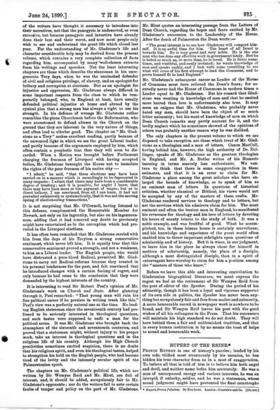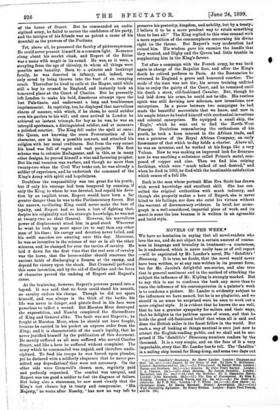RUPERT OF THE RHINE.* PRINCE RUPERT is one of history's
puzzles; lauded by hie own side, vilified most strenuously by his enemies, he has hidden his true character from ne in a mist of exaggeration. To believe all that is told of him is to believe him both angel and devil, and neither name befits him accurately. He was a man of unsurpassed energy and various interests, he was an intrepid, if unlucky, soldier, and he was a statesman, whose sound judgment might have prevented the final catastrophe
• Rupert,Prince Palatine. By Eva Scott. London : Constable and Co. [15s. net] of the house of Stuart. But he commanded an undis- ciplined army, be failed to secure the confidence of his party, and the intrigue of his friends was as potent a cause of his downfall as the prowess of the Puritans.
Yet, above all, he possessed the faculty of picturesqueness. He could never present himself in a common light. Romance clung about his scarlet cloak, and Rupert of the Rhine was a name with magic in its sound. He was, as it were, a strayling from the age of chivalry, to whom all things were possible save banality. Born to a quixotic and bankrupt family, he was deserted in infancy, and, indeed, was only saved by being thrown into the boot of an escaping coach. Thereafter he lived in exile at the Hague, until while still a boy he crossed to England, and instantly took an honoured place at the Court of Charles. But he presently left London to make his bold, disastrous attempt upon the lost Palatinate, and underwent a long and troublesome imprisonment. In captivity, too, he displayed that marvellous charm of manner, with which, if he chose, he could subdue even his gaolers to his will ; and once arrived in London he achieved an instant triumph, for boy as he was, he was an intrepid sportsman, a distinguished soldier, and at moments a polished courtier. The King fell under the spell at once ; the Queen, nob knowing the stern Protestantism of his character, saw in him a possible convert, and attacked his religion with her usual craftiness. But from the very outset his head was fall of vague and vast projects. His first scheme was to colonise Madagascar, and in this, as in many other designs, he proved himself a wise and farseeing prophet. But his real vocation was warfare, and though no more than twenty-two when the Civil War broke out, he was already a soldier of experience, and he undertook the command of the King's Army with spirit and hopefulness.
Doubtless the responsibility was too great for his youth, but if only his courage had been tempered by cunning, if only the King, to whom he was devoted, had repaid his devo- tion by an implicit trust, Rupert would have been a far greater danger than he was to the Parliamentary forces. But the narrow, vacillating King could never make the best of loyalty, and Rupert had so keen a lust of fighting that, despite his originality and his strategic knowledge, he was not at twenty-two an ideal General. However, his marvellous power of displacement stood him in good stead. Wherever he went he took up more space (so to say) than any other man of his time ; his energy and devotion never failed, and his swift marches are amazing unto this day. Moreover, he was as inventive in the science of war as in all the other sciences, and he changed for ever the tactics of cavalry. He laid it down for the first time that the real arm of cavalry was the horse, that the horse-soldier should renounce the ancient habit of discharging a firearm at the enemy, and depend for victory upon the shock. But Cromwell perfected this same invention, and by the aid of discipline and the force of character proved the undoing of Rupert and Rupert's cause.
At the beginning, however, Rupert's prowess passed into a legend. It was said that no force could stand his assault, no cavalry endure his charge. Though he did not spare himself, and was always in the thick of the battle, his life was never in danger, and pistols fired in his face were powerless to inflict a wound. But Marston Moor destroyed the superstition, and Naseby completed the discomfiture of King and General alike. The fault was not Rupert's ; he fought at Marston Moor, when he should not have fought, because he carried in his pocket an express order from the King; and it is characteristic of the man's loyalty, that he never justified himself by the publication of this document. He merely suffered as all men suffered who served Charles Stuart, and like a hero he suffered without complaint. The army which he commanded was unpaid, and therefore undis- ciplined. To feed his troops he was forced upon plunder, yet he declared with a soldierly eloquence that he never per- mitted any depredations: that were not necessary. On the other side were Cromwell's chosen men, regularly paid and perfectly organised. The combat was unequal, and Rupert was too good a soldier to feel the disgrace of failure. But being also a statesman, he saw most clearly that the King's last chance lay in treaty and compromise. " His Majesty," he wrote after Naseby, " has now no way left to
preserve his posterity, kingdom, and nobility, but by a treaty; I believe it to be a more prudent way to retain something than to lose all." The King replied to this wise counsel with a mere repetition of the commonplaces concerning his divine right to the throne. But Rupert's very moderation had ruined him. His wisdom gave his enemies the handle that they wanted, and Digby and the Queen had little trouble in supplanting him in the King's favour.
Yet after a campaign with the French army, he was back again in charge of the Royalist fleet, and after the King's death he retired perforce to Paris. At the Restoration he returned to England a grave and honoured courtier. The mode of the time was not his ; his severe training unfitted him to enjoy the gaiety of the Court, and he remained until his death a stern, old-fashioned Cavalier. But, though he had laid down his arms, he could not be idle. His restless spirit was still devising new schemes, new inventions, new enterprises. In a pause between two campaigns he had made the beautiful mezzotints that we know, and now in his ample leisure he busied himself with mechanical inventions and colonial enterprises. He equipped a small ship, the ' Eagle,' which he sent out to find the North-West Passage. Doubtless remembering the enthusiasm of his youth, he took a keen interest in the African trade, and was a patentee of the Royal African Company, an early forerunner of that which to-day holds a charter. Above all, he was an inventor, and be worked at his forge like a very Vulcan. Now he was making an improved lock for firearms, now he was smelting a substance called Prince's metal, com- posed of copper and zinc. Then we find him coining farthings, which were "much talked of and desired," and when he died in 1662, he died with the inestimable satisfaction which comes of a full life.
Such is the man whose portrait Miss Eva Scott has drawn with sound knowledge and excellent skill. She has con- sulted the original authorities with much industry, and though she properly makes a hero of Rupert, she is never blind to his failings, nor does she extol his virtues without the warrant of documentary evidence. In brief, her mono- graph is a well-considered, impartial piece of work, and its merit is none the less because it is written in an agreeable and lucid style.



















































 Previous page
Previous page